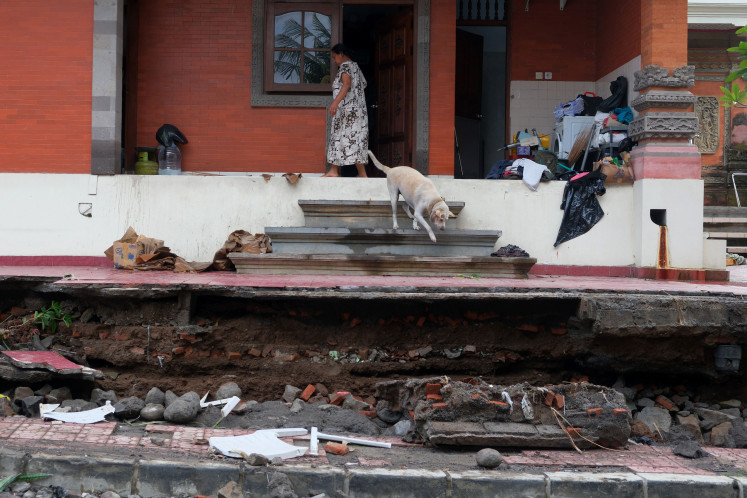Popular Reads
Top Results
Can't find what you're looking for?
View all search resultsPopular Reads
Top Results
Can't find what you're looking for?
View all search resultsJakarta calls on KL to pick up the slack
In the wake of multiple abductions in the tri-border area between Indonesia, Malaysia and the Philippines over the weekend, the government has urged its neighbors to take responsibility for the incidents occurring outside of Jakarta’s jurisdiction
Change text size
Gift Premium Articles
to Anyone
I
n the wake of multiple abductions in the tri-border area between Indonesia, Malaysia and the Philippines over the weekend, the government has urged its neighbors to take responsibility for the incidents occurring outside of Jakarta’s jurisdiction.
Three more Indonesian sailors were abducted by unidentified gunmen off Malaysia’s eastern state of Sabah, despite ongoing efforts to contain the number of armed robberies in those waters.
A tugboat with a crew of seven people was sailing near Lahad Datu district not far from the Eastern Sabah Security Command (Esscom) naval base when armed robbers slipped on board to grab three documented Indonesian sailors.
Four other crew members, including an undocumented Indonesian, were released because the abductors were unable to accommodate them on their getaway speedboat.
The Foreign Ministry’s director for the protection of Indonesian nationals and entities abroad, Lalu Muhammad Iqbal, said the government continues to maintain contact with the shipowners, having recently facilitated a visit by one of the sailor’s family members.
Iqbal stressed, however, that the onus was on Kuala Lumpur and the Malaysian-based companies to resolve this case.
“Our [role] is to communicate with them and continue pushing them to take responsibility,” Iqbal told reporters on Wednesday.
The Malaysian Embassy in Indonesia did not respond to a request for comment.
The three governments have come under fire for being seemingly unable to overcome a recent spike in abductions in the same area in recent months, in spite of concerted efforts.
Iqbal said the government was expecting concrete results from an upcoming trilateral meeting between defense ministers, a follow-up to the overture made in a meeting in Yogyakarta earlier in the year.
Among the most-anticipated proposals for trilateral cooperation is coordinated sea patrols in the tri-border area.
A total of 25 Indonesian tugboat crew members have been abducted in the last four months in the area, raising concerns over the safety of the strategic shipping corridor.
Unconfirmed reports of ransom having been paid to secure the release of 14 hostages earlier this year might have triggered the later abductions.
On Monday, Foreign Minister Retno LP Marsudi confirmed an earlier abduction of seven Indonesian tugboat crew members in the Philippines’ Sulu Sea on June 20, saying they were tired, but in good health.
“I have spoken with the Philippine and Malaysian foreign ministers and urged them to focus their attention on this new case — this incident cannot be tolerated,” Retno said.
Meanwhile, experts have agreed that armed robbery and other sea-bound crimes in the tri-border area have posed a consistent challenge for countries in the region for well over a decade and that it was high time for all the governments involved to step up their game.
Evan Laksmana, an international security and defense expert from the Centre for Strategic and International Studies (CSIS), said it was important for concerned parties to better communicate with each other, but also to instigate better information sharing between different port authorities and shipping companies.
Such measures not only can help with possible preventive measures when going through troubled waters, but also help unify a common position with regards to hostage-takings and negotiations, he said.
If reports suggesting ransom was paid turn out to be true, Evan believed that ship owners and companies should also be asked to better coordinate their responses with their respective governments and security forces.
“What we need now is better and more, not less, engagement with our neighbors, as well as with different stakeholders, including the different maritime security agencies and private shipping companies,” Evan said.
Adriana Elisabeth, an international relations expert from the Indonesian Institute of Sciences (LIPI), questioned ASEAN’s solidarity when taking up issues such as this, saying there should have already been a shared awareness among the neighbors, considering how susceptible the area is to sea-bound crime.
“This is about safe passage through a shipping corridor. If we all know how important cooperation is, why has this issue only recently come to the fore?” Adriana said.










